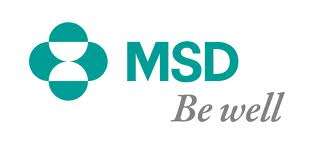Merck Receives CHMP Positive Opinion Recommending Approval of ISENTRESS® (raltegravir) 600 mg in the European Union

KENILWORTH, N.J., May 18, 2017 – Merck (NYSE: MRK), known as MSD outside the United States and Canada,
today announced that the Committee for Medicinal Products for Human Use (CHMP) of the European Medicines Agency (EMA) has adopted a positive opinion recommending approval of ISENTRESS® (raltegravir) 600 mg film-coated tablets, in combination with other anti-retroviral medicinal products, for the treatment of HIV-1 infection in adults and pediatric patients weighing at least 40 kg. In adults and pediatric patients (weighing at least 40 kg), the recommended dosage is 1,200 mg (two 600 mg tablets) once daily for treatment-naïve patients or patients who are virologically suppressed on an initial regimen of ISENTRESS 400 mg twice daily. The recommendation will now be reviewed by the European Commission for marketing authorization in the European Union. A decision on approval is expected in the second half of 2017. The once daily formulation of ISENTRESS is currently under review in the United States by the Food and Drug Administration. “The CHMP’s positive opinion recommending the approval of ISENTRESS 600 mg film-coated tablets is an important step toward a new option for people living with HIV who are looking for once-daily dosing, as part of an HIV treatment regimen, with proven efficacy and safety,” said Dr. Eliav Barr, senior vice president, global clinical development, infectious diseases and vaccines, Merck Research Laboratories. The CHMP positive opinion was based on findings from the ONCEMRK trial, an ongoing Phase 3 multicenter, double-blind, randomized, active comparator-controlled clinical trial designed to evaluate the efficacy and safety of ISENTRESS 1200 mg, given as two 600 mg oral tablets once daily, compared to ISENTRESS 400 mg twice daily, each in combination with emtricitabine + tenofovir disoproxil fumarate in previously untreated HIV-1 infected adults. Once-
– 2 –
daily ISENTRESS 600 mg (1200 mg total), when used as part of an HIV-1 treatment regimen, demonstrated comparable efficacy and safety to ISENTRESS 400 mg twice a day after 48-weeks of treatment across a variety of patient populations.
About ISENTRESS (raltegravir)
ISENTRESS is MSD’s integrase inhibitor for the treatment of HIV-1 infection in adult and pediatric patients aged four weeks and older and weighing at least 3 kg as part of combination HIV therapy. ISENTRESS works by inhibiting the insertion of HIV-1 DNA into human DNA by the integrase enzyme and has demonstrated rapid antiviral activity. Inhibiting integrase from performing this essential function limits the ability of the virus to replicate and infect new cells. ISENTRESS is approved as part of combination therapy in 112 countries for treatment of HIV-1 infection in adults. ISENTRESS chewable tablets, in combination therapy, for use in children and adolescents with HIV-1 aged two years and older has also been approved for use in 69 countries, and ISENTRESS granules for oral suspension for infants at least four weeks of age is approved for use in 33 countries.
Selected Important Safety Information for ISENTRESS® (raltegravir) Severe, potentially life-threatening and fatal skin reactions have been reported. This includes cases of Stevens-Johnson syndrome, hypersensitivity reaction and toxic epidermal necrolysis. Immediately discontinue treatment with ISENTRESS and other suspect agents if severe hypersensitivity, severe rash, or rash with systemic symptoms or liver aminotransferase elevations develops and monitor clinical status, including liver aminotransferases closely. Immune reconstitution syndrome can occur, including the occurrence of autoimmune disorders with variable time to onset, which may necessitate further evaluation and treatment. ISENTRESS chewable tablets contain phenylalanine, a component of aspartame, which may be harmful to patients with phenylketonuria.
Co-administration of ISENTRESS with drugs that are strong inducers of uridine diphosphate glucuronosyltransferase (UGT) 1A1 may result in reduced plasma concentrations of raltegravir. Co-administration of ISENTRESS with drugs that inhibit UGT1A1 may increase plasma levels of raltegravir. Co-administration of ISENTRESS and other drugs may alter the plasma concentration of raltegravir. The potential for drug-drug interactions must be considered prior to and during therapy. Co-administration or staggered administration of aluminum and/or magnesium hydroxide-containing antacids and ISENTRESS is not recommended. Rifampin, a strong inducer of UGT1A1, reduces plasma concentrations of ISENTRESS. Therefore, the dose of ISENTRESS for adults should be increased to 800 mg twice daily during co-administration with rifampin. There are no data to guide co-administration of ISENTRESS with rifampin in patients below 18 years of age.
The most commonly reported (≥ 1/100 to < 1/10),drug-related clinical adverse reactions were decreased appetite, abnormal dreams, insomnia, nightmare, abnormal behaviour, depression, dizziness, headache, psychomotor hyperactivity, vertigo, abdominal distention, abdominal pain, diarrhoea, flatulence, nausea, vomiting, dyspepsia, rash, asthenia, fatigue, pyrexia, alanine aminotransferase increased, atypical lymphocytes, aspartate aminotransferase, increased, blood triglycerides increased, lipase , increased and blood pancreatic amylase increased. .
Grade 2–4 creatine kinase laboratory abnormalities were observed in subjects treated with ISENTRESS. Myopathy and rhabdomyolysis have been reported. Use with caution in patients at increased risk of myopathy or rhabdomyolysis, such as patients receiving concomitant medications known to cause these conditions and patients with a history of rhabdomyolysis, myopathy or increased serum creatine kinase. Rash occurred more commonly in treatment-experienced subjects receiving regimens containing ISENTRESS + darunavir/ritonavir compared to subjects receiving ISENTRESS without darunavir/ritonavir or darunavir/ritonavir without ISENTRESS. However, rash that was considered drug related occurred at similar rates for all 3 groups. These rashes were mild to moderate in severity and did not limit therapy; there were no discontinuations due to rash.
ISENTRESS should be used during pregnancy only if the potential benefit justifies the potential risk to the fetus. There are no adequate and well-controlled studies in pregnant women. In addition, there have been no pharmacokinetic studies conducted in pregnant patients.
To monitor maternal-fetal outcomes of pregnant patients exposed to ISENTRESS, an Antiretroviral Pregnancy Registry has been established. Physicians are encouraged to register patients by calling 1-800-258-4263.
About MSD
For more than a century, MSD, a leading global biopharmaceutical company, has been inventing for life, bringing forward medicines and vaccines for the world’s most challenging diseases. MSD is a trade name of Merck & Co., Inc., with headquarters in Kenilworth, N.J., U.S.A. Through our prescription medicines, vaccines, biologic therapies and animal health products, we work with customers and operate in more than 140 countries to deliver innovative health solutions. We also demonstrate our commitment to increasing access to health care through far-reaching policies, programs and partnerships. Today, MSD continues to be at the forefront of research to advance the prevention and treatment of diseases that threaten people and communities around the world – including cancer, cardio-metabolic diseases, emerging animal diseases, Alzheimer’s disease and infectious diseases including HIV and Ebola.
For more information, visit www.msd.com or call us at MSD in Cyprus at 800 00 673.






